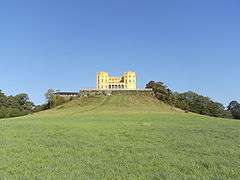The Dower House, Stoke Park
| The Dower House, Stoke Park | |
|---|---|
|
The Dower House, Stoke Park, Bristol after restoration | |
 The Dower House, Stoke Park | |
| OS grid reference | ST 62230 77247 |
| Coordinates | 51°29′34″N 2°32′44″W / 51.492896°N 2.545427°W |
The Dower House, Stoke Park is a building in Bristol, England. It is one Bristol's more prominent landmarks, set on Purdown, a hill above the M32 motorway on the main approach into the city, and painted yellow.[1]
The house was built in 1553 by Sir Richard Berkeley. Rebuilt by Norborne Berkeley, 4th Baron Botetourt circa 1760, it eventually became used as a dower house by the Dukes of Beaufort at nearby Badminton House. This included Charles Somerset, 4th Duke of Beaufort (The son of Henry Somerset, 2nd Duke of Beaufort) and wife Elizabeth Somerset, Duchess of Beaufort whose obelisk can be found on the hill she died on from falling off a horse to this date.[2]
It was used as part of Stoke Park Hospital, previously Stoke Park Colony, from 1909. The house closed as a hospital building about 1988, and was converted into apartments in 2004.[3][4]
The estate is now maintained as an open space by Bristol City Council, known as Stoke Park Estate.
Several aspects of the house and estate are listed. The house is Grade II* listed.[2] The balustraded terrace, the Orangery, the remains of the Obelisk, and the Broomhill Gate are all Grade II listed. The woods contain the Beaufort Memorial, the cold bath and a partially derelict stone tunnel with rusticated entrance arches, all also Grade II listed.[4]
References
- ↑ "Still standing strong". This is Bristol. 21 March 2011. Retrieved 16 September 2012.
- 1 2 Historic England. "Dower House (Grade II*) (1136240)". National Heritage List for England. Retrieved 20 September 2012.
- ↑ "A Management Plan for Stoke Park Estate" (PDF). Bristol City Council. Retrieved 12 November 2015.
- 1 2 Historic England. "Stoke Park (Grade II) (1000129)". National Heritage List for England. Retrieved 20 September 2012.
External links
- Stoke Park Estate, Bristol City Council
- The History of Stoke Park, edited by Adrian Kerton, Glenside Museum
